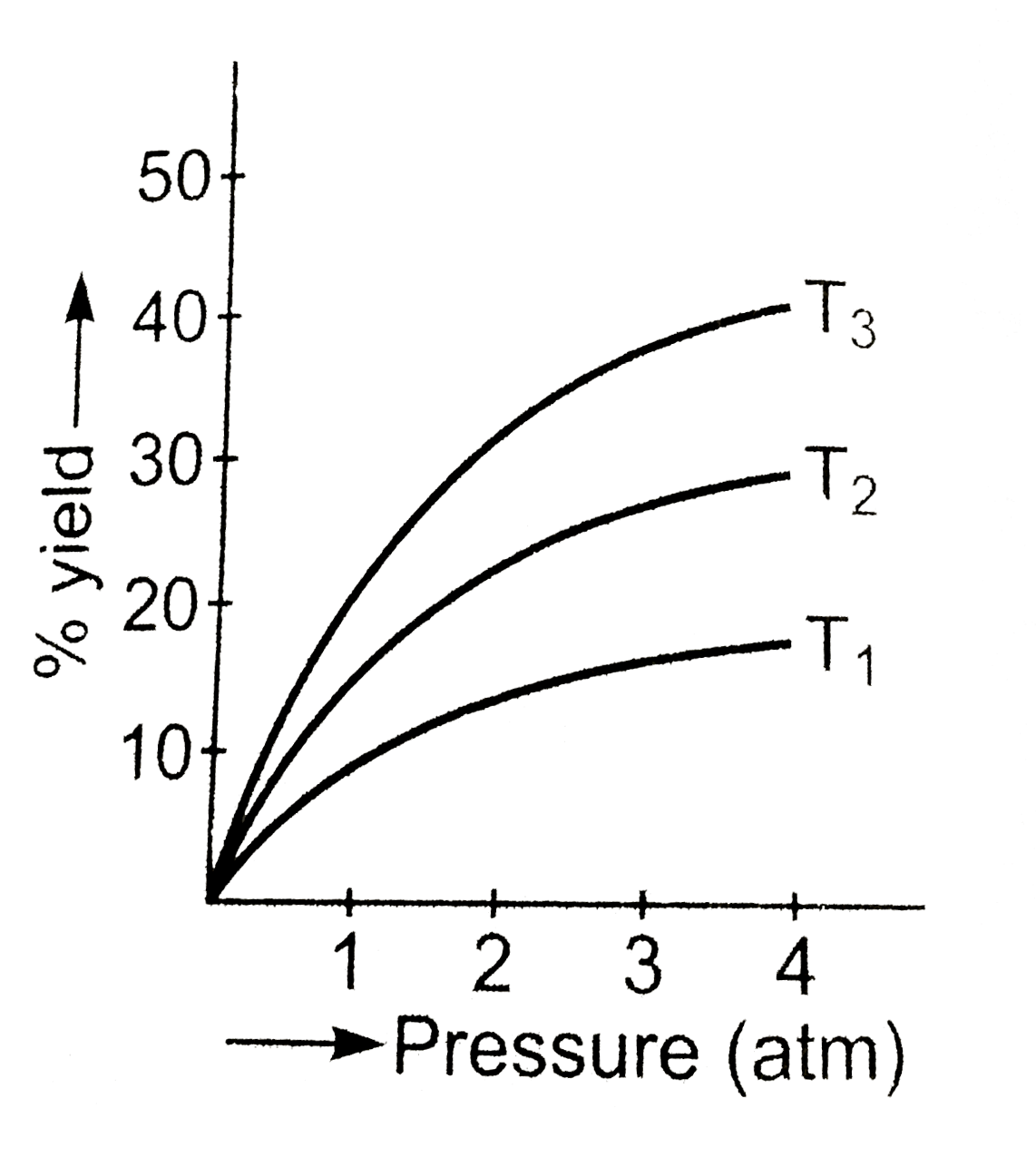The oxidation of SO2 to SO3 is an exothermic reaction. The yield of SO3 will be maximum if :
Temperature is increased and pressure is kept constant
Temperature is reduced and pressure is increased
Both temperature and pressure are increased
Both temperature and pressure are reduced
The correct Answer is:B
To determine the conditions under which the yield of SO3 will be maximized during the oxidation of SO2 to SO3, we can analyze the reaction using Le Chatelier's principle and the characteristics of exothermic reactions.
1. Identify the Reaction:
The balanced chemical equation for the reaction is:
SO2+12O2→SO3
2. Determine the Nature of the Reaction:
The reaction is described as exothermic, which means it releases heat. In terms of enthalpy change (ΔH), we have:
ΔH<0
3. Apply Le Chatelier's Principle for Temperature:
According to Le Chatelier's principle, for exothermic reactions, lowering the temperature favors the formation of products. Thus, to maximize the yield of SO3, the temperature should be reduced.
4. Analyze the Effect of Pressure:
Next, we need to consider the effect of pressure on the reaction. We can count the number of moles of gas on both sides of the reaction:
- Reactants: SO2 (1 mole) + O2 (0.5 moles) = 1.5 moles
- Products: SO3 (1 mole) = 1 mole
Since the number of moles of gas decreases from 1.5 moles (reactants) to 1 mole (products), increasing the pressure will favor the formation of SO3.
5. Conclusion:
Therefore, to maximize the yield of SO3, the conditions should be:
- Temperature: Reduced (low temperature)
- Pressure: Increased (high pressure)
Thus, the correct answer is: Temperature is reduced and pressure is increased.
The balanced chemical equation for the reaction is:
SO2+12O2→SO3
The reaction is described as exothermic, which means it releases heat. In terms of enthalpy change (ΔH), we have:
ΔH<0
According to Le Chatelier's principle, for exothermic reactions, lowering the temperature favors the formation of products. Thus, to maximize the yield of SO3, the temperature should be reduced.
Next, we need to consider the effect of pressure on the reaction. We can count the number of moles of gas on both sides of the reaction:
- Reactants: SO2 (1 mole) + O2 (0.5 moles) = 1.5 moles
- Products: SO3 (1 mole) = 1 mole
Therefore, to maximize the yield of SO3, the conditions should be:
- Temperature: Reduced (low temperature)
- Pressure: Increased (high pressure)
Similar Questions
The oxidation of SO2 by O2 to SO3 is an exothermic process. The yield of SO3 is maximum if
i. Temperature is increased and pressure is kept constant
ii. Temperature is reduced and pressure is kept constant
iii. Pressure is increased
iv. Temperature and pressure both are increased
The correct option is:
View SolutionThe Oxidation number of S in (CH3)2SO is :
View SolutionWhat is the catalyst used for oxidation of SO2 to SO3 in lead chamber process for manufacture of sulphuric acid ?
View SolutionThe prepation of SO3(g) by reaction SO2(g)+12O2(g)⇔SO3(g) is an exothermic reaction .If the preparation follows the following temperature -pressure relationship for % yield , then for temperatures T1,T2andT3 the correct option is:

View SolutionThe reaction of SO2 with PCl5 yield two oxohalides A and B. What is A and B ?
View SolutionFormation of SO3 by SO2 and O2 is favoured by :−
View SolutionThe values of heat of formation of SO2 and SO3 are - 298.2 kJ and - 98.2 kJ. The heat of reaction of the following reaction will be SO2(g)+12O2(g)→SO3(g)
View SolutionWhat is the oxidation number of Sulphur in Na2SO3 molecule ?
View SolutionA mixture of SO3,SO2 and O2 gases is maintained in a 10L flask at a temperature at which the equilibrium constant for the reaction is 100:
2SO2(g)+O2(g)⇔2SO3(g)
a. If the number of moles of SO2 and SO3 in the flask are equal. How many moles of O2 are present?
b. If the number of moles of SO3 in flask is twice the number of moles of SO2, how many moles of oxygen are present?
View SolutionThe rate of formation of SO3 in the following reaction: 2SO2+O2→2SO3 is 10gsec−1. The rate of disappearance of O2 will be
View Solution
